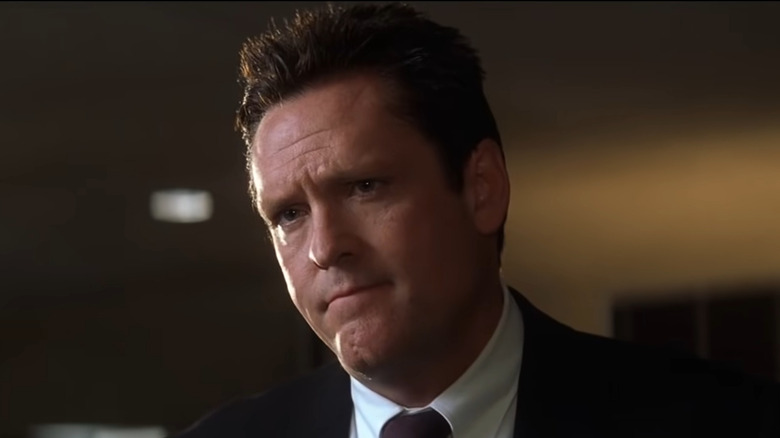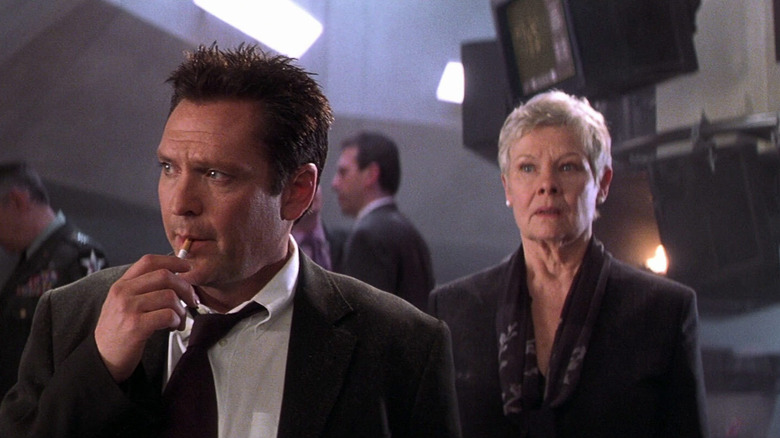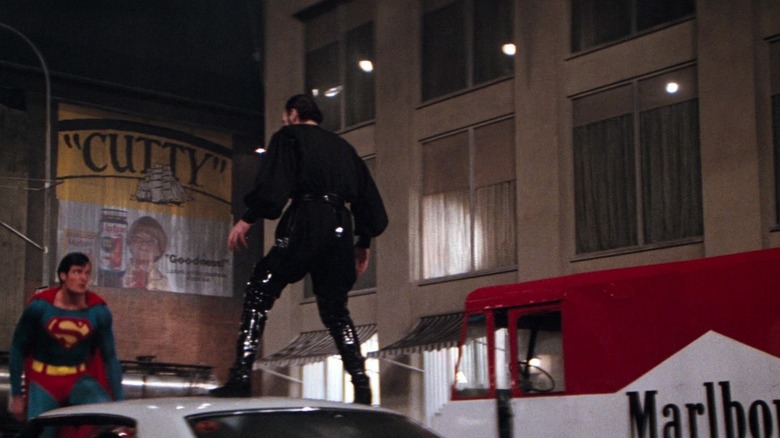Die Another Day Kept A Scene Michael Madsen Was Sure Would Get Cut
Barring George Lazenby, every actor who steps into the role of 007 has had their high and low points, with Pierce Brosnan's run being a real mixed bag.
Brosnan's first Bond film, "Goldeneye," is still regarded as one of Bond's finest hours and also has the honor of inspiring one of the greatest first-person shooter video games ever made. His next foray as Bond, 1997's "Tomorrow Never Dies," is a blast of a late '90s action spy flick and holds a special place in my heart as the first of Brosnan's era that I ever saw. Folks made fun of Denise Richards' Dr. Christmas Jones in 1999's "The World is Not Enough," and while the film showed a steady decline in Bond entertainment, it's largely a fun popcorn flick.
Lastly, we come to Brosnan's final outing as 007. I don't share the same contempt for 2002's "Die Another Day" as a lot of folks do, but make no mistake — it is undeniably Brosnan's Bond at his lowest. It's super silly (even for Bond standards), relies way too heavily on hilariously outdated CGI, and feels like a whimper of a 40th-anniversary film to boot.
There are some details, however — and even actors — that slipped by me when I last saw it. For instance, I had forgotten that Michael Madsen shows up for a brief scene prior to the big cargo plane climax. He plays an NSA agent named Damian Falco, who is the boss of Halle Berry's Jinx. As it turns out, there's something Madsen does in this scene that he thought would end up on the chopping block: he lights a cigarette.
Lighting up next to Dame Judi Dench
In a 2015 interview with The A.V. Club, Michael Madsen talked about how he wasn't sure if he would be able to light up in the scene. "I know not many people smoke cigarettes in movies anymore, especially not in a Bond film and the way they are nowadays," he said.
But while Madsen pulling out the cigarette sent the crew into panic mode, it was Dame Judi Dench who ultimately stuck up for the actor's decision:
"I pulled it out to light it, and everyone's, like, 'Whoa, hey, hey, hey, oh, no, no, no ...' And then Judi Dench, she said, 'Well, I don't see anything wrong with Michael's character smoking a cigarette. It's quite apropos for him.' And then Lee [Tamahori] was like [In a British accent.] 'Yeah, I think that's right. Yeah, that's a good thing. All right, Michael, we'll let you have that cigarette! But I thought that they for sure would not leave it in the movie."
Each studio has come up with its own set of rules for smoking since, as it can sometimes affect a film's rating. It's certainly not as casual as it once was. Dench was right though — in this case, it makes sense for a stressed American agent to inappropriately light up in an underground bunker with nowhere for the smoke to go. In terms of 007 himself lighting up, Brosnan's Bond went without smoking until it came to "Die Another Day," where he can be seen puffing on a cigar. Daniel Craig's Bond also abstained from the tradition altogether.
The history of Hollywood cigarettes
After the arrival of "talkies" in the 1920s, the movie industry and the tobacco industry developed a close bond, with movie stars both advertising cigarettes and smoking them on screen in their movies (per Smoke Free Media). By 1970, the serious health impacts of smoking had begun to emerge and President Richard Nixon banned commercials for tobacco products — but there was a loophole: product placement.
If you've noticed that a lot of movies from the 1970s and 1980s have characters frequently smoking cigarettes, and there's a conspicuous presence of tobacco brand logos, that was no accident. After advertising was banned, the tobacco industry doubled down on movies and TV shows as a means of getting new customers hooked. Tobacco company Philip Morris paid $43,000 to have the Marlboro brand heavily featured throughout 1981's "Superman II," and to have Lois Lane chain-smoking in the movie.
By the end of the 1980s, a congressional investigation into tobacco product placement in movies was underway, and in 1990 the Tobacco Institute announced a voluntary ban on product placement ... though by many accounts it still persevered, albeit more discreetly. These days, smoking on screen seems to be making a bit of a comeback; in 2019, the Center for Disease Control said that tobacco use in movies had increased by 57% since 2010, and in biographical dramas was up by 233%.
Most of the time, though, the cigarettes you see actors puffing on don't contain actual tobacco or nicotine, but a mix of herbs. According to "Mad Men" star Jon Hamm, they taste like "a mix of pot and soap."


